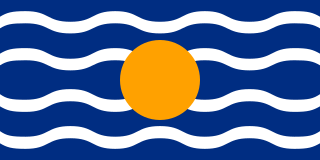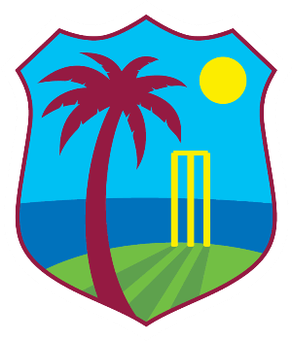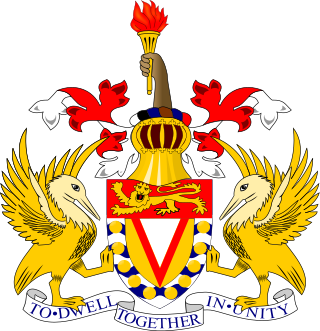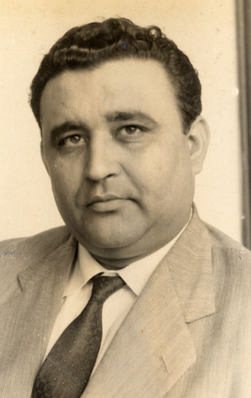The Eastern Caribbean dollar is the currency of all seven full members and one associate member of the Organisation of Eastern Caribbean States (OECS). The successor to the British West Indies dollar, it has existed since 1965, and it is normally abbreviated with the dollar sign $ or, alternatively, EC$ to distinguish it from other dollar-denominated currencies. The EC$ is subdivided into 100 cents. It has been pegged to the United States dollar since 7 July 1976, at the exchange rate of US$1 = EC$2.70.

Eric Eustace Williams was a Trinidad and Tobago politician who is regarded by some as the "Father of the Nation", having led the then British Colony of Trinidad and Tobago to majority rule on 28 October 1956, to independence on 31 August 1962, and republic status on 1 August 1976, leading an unbroken string of general elections victories with his political party, the People's National Movement, until his death in 1981. He was the first Prime Minister of Trinidad and Tobago and also a noted Caribbean historian, especially for his book entitled Capitalism and Slavery.

The West Indies Federation, also known as the West Indies, the Federation of the West Indies or the West Indian Federation, was a short-lived political union that existed from 3 January 1958 to 31 May 1962. Various islands in the Caribbean that were part of the British Empire, including Trinidad and Tobago, Barbados, Jamaica, and those on the Leeward and Windward Islands, came together to form the Federation, with its capital in Port of Spain, Trinidad and Tobago. The expressed intention of the Federation was to create a political unit that would become independent from Britain as a single state — possibly similar to Canada, the Federation of Australia, or the Central African Federation. Before that could happen, the Federation collapsed due to internal political conflicts over how it would be governed or function viably. The formation of a West Indian Federation was encouraged by the United Kingdom, but also requested by West Indian nationalists.

The British West Indies (BWI) were colonised British territories in the West Indies: Anguilla, the Cayman Islands, Turks and Caicos Islands, Montserrat, the British Virgin Islands, Antigua and Barbuda, The Bahamas, Barbados, Dominica, Grenada, Jamaica, Saint Kitts and Nevis, Saint Lucia, Saint Vincent and the Grenadines, British Guiana and Trinidad and Tobago. Other territories include Bermuda, and the former British Honduras.

Sir Vere Cornwall Bird, KNH was the first Prime Minister of Antigua and Barbuda. His son, Lester Bryant Bird, succeeded him as Prime Minister. In 1994, he was declared a "National Hero".

Sir Grantley Herbert Adams, CMG, QC was a Barbadian politician. He served as the inaugural premier of Barbados from 1953 to 1958 and then became the first and only prime minister of the West Indies Federation from 1958 to 1962. He was a founder of the Barbados Labour Party (BLP), and he was named in 1998 as one of the National Heroes of Barbados.
The British West Indies dollar (BWI$) was the currency of British Guiana and the Eastern Caribbean territories of the British West Indies from 1949 to 1965, when it was largely replaced by the East Caribbean dollar, and was one of the currencies used in Jamaica from 1954 to 1964. The monetary policy of the currency was overseen by the British Caribbean Currency Board (BCCB). It was the official currency used by the West Indies Federation The British West Indies dollar was never used in British Honduras, the Cayman Islands, the Turks and Caicos Islands, the Bahamas, or Bermuda.

The People's National Movement (PNM) is the longest-serving and oldest active political party in Trinidad and Tobago. The party has dominated national and local politics for much of Trinidad and Tobago's history, contesting all elections since 1956 serving as the nation's governing party or on four occasions, the main opposition. As a result, it has sometimes been referred to as Trinidad and Tobago's "main political party". There have been four PNM Prime Ministers and multiple ministries. The party espouses the principles of liberalism and generally sits at the centre to centre-left of the political spectrum.
The West Indies Democratic Labour Party (DLP) or Democrats was one of two Federal parties in the short-lived West Indies Federation, the other being the West Indies Federal Labour Party (WIFLP). The party was organised by Sir Alexander Bustamante to counter the WIFLP led by his cousin Norman Manley. In the 1958 West Indies federal elections, the party lost, winning 19 of the 45 seats in the Federal Parliament of the West Indies Federation.
Albert Maria Gomes was a Trinidadian unionist, politician, and writer of Portuguese descent, was the first Chief Minister of Trinidad and Tobago. He was the founder of the Political Progress Groups and later led the Party of Political Progress Groups. He was active in the formation of the Democratic Labour Party (DLP) in Trinidad and Tobago and played a role in forcing Sir Alexander Bustamante out of the Federal Democratic Labour Party. Gomes briefly led DLP in 1963 when factions loyal to briefly ousted Rudranath Capildeo after Capildeo left Trinidad and Tobago to take up a position at the University of London. However, the rank and file of the party stood behind Capildeo, and Gomes left the party.

The term British West Indies refers to the former English and British colonies and the present-day overseas territories of the United Kingdom in the Caribbean.

Cricket West Indies (CWI) is the governing body for cricket in the West Indies. It was originally formed in the early 1920s as the West Indies Cricket Board of Control, but changed its name to West Indies Cricket Board (WICB) in 1996. In November 2015, the Board resolved to rename itself as Cricket West Indies as part of a restructuring exercise that would also see the creation of a separate commercial body. This rebranding formally occurred in May 2017.
A series of workplace disturbances, strikes, and riots broke out across the British West Indies in the period between 1934 and 1939. These began as the Great Depression wore on and ceased on the eve of World War II. The unrest served to highlight inequalities of wealth, led the British government to attempt a solution to the problem, and in some cases spurred the development of indigenous party politics that would lead to self-government and independence in the postwar period.

The prime minister of the West Indies Federation was the head of government of the short lived West Indies Federation, which consisted of ten provinces: Antigua, Barbados, Dominica, Grenada, Jamaica, Montserrat, St. Christopher-Nevis-Anguilla, St. Lucia, St. Vincent, and Trinidad and Tobago. The federation was formed on 3 January 1958, and was formally dissolved on 31 May 1962.

Ashford Sastri Sinanan was a politician from Trinidad and Tobago who served in various roles prior to and following Trinidad and Tobago’s independence in 1962. Along with his brother, Mitra, Sinanan helped draft portions of Trinidad’s constitution and later went on to serve as the country’s first High Commissioner to India. High office, however, ultimately eluded him: first, in his 1958 bid to become the first Prime Minister of the Federation of the West Indies, a contest that he narrowly lost by 2 seats to Barbados’ Sir Grantley Adams; and second, in 1974, when he resigned from his post as High Commissioner to India to found the West Indian National Party (WINP). The WINP ultimately failed to break the 20-year rule of then Prime Minister, Eric Williams.

Federal elections were held in the West Indies Federation for the first and only time on 25 March 1958. The result was a victory for the West Indies Federal Labour Party, which won 25 of the 45 seats in the House of Representatives.
The British West Indies Championships was an annual track and field competition between nations involved in the West Indies Federation and several other Caribbean nations with a British colonial history. Like the federation itself, the competition was short-lived: first held in 1957, it ceased after 1965. The competition was created at a time of much sporting co-operation within the region – a British West Indies team was sent to both the 1959 Pan American Games and the 1960 Summer Olympics.

Ronald Jay Williams was a Trinidadian businessman and politician. He was a Member of Parliament for the West Indies Federation, Senator of Trinidad and Tobago, and Member of Parliament of Trinidad and Tobago. From 1981 to 1986, he served as Minister of State Enterprises. During his tenure in government, his drive to reduce waste and seek cost efficiencies earned him the nickname "Chinese Chopper", a reference to his ethnicity and his willingness to cut expenditures.

The Tobago Council of the People's National Movement, also known as the Tobago Council of the PNM, PNM Tobago or PNM Tobago Council, is the longest-serving and oldest active political party in Tobago. The party is the autonomous branch of the Trinidad and Tobago People's National Movement operating in Tobago. While its political leader acts in the local capacity, they also serve as a deputy leader on a national level. The party's executives organize for both local and national election campaigns. There have been three PNM Chief Secretaries and administrations.














